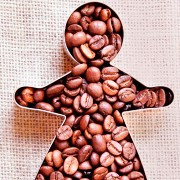 Photo: Getty Images
Photo: Getty Images
When I was 12, I remember seeing a cousin giving her toddler a baby bottle filled with Diet Coke. At the time, I thought something seemed out of place, but now as a parent I am appalled on so many levels. Beyond the potential effects of artificial sweeteners (that’s a topic for another day!) I can’t imagine giving that much caffeine to my 5-year-old, much less a 1-year-old.
I admit, begrudgingly, that whenever we pass a Starbucks, my 3-year-old daughter points it out and asks to make a pit stop. Of course, her craving is a scone and vanilla milk. Still, children nowadays are exposed at least to the idea of caffeine consumption much more than we were in past generations. And kids certainly get their fair share of caffeine even if we don’t recognize that we’re giving it to them. (A 1.5-ounce bar of milk chocolate contains 9 mg of caffeine, as do an 8-ounce cup of hot cocoa and a 4-ounce pudding cup.)
Indeed, according to MedicineNet.com, children and adolescents consume 70 percent more caffeine than their counterparts 30 years ago. On average, young teens consume almost half as much caffeine as adults on a daily basis. As the effects of caffeine on growing bodies are uncertain, this data is alarming.
Back in high school, I remember cramming for exams with friends, using caffeine pills, cola and chocolate chip cookie dough to keep us up almost all night. If our parents had any idea we were “snacking” this way, they’d undoubtedly have raised red flags. But the effects of the caffeine were so striking even to us as teenagers in the 1980s -- we knew the extra energy from the caffeine would help keep us alert and focused for a longer period of time. The potential adverse effects were far from our minds at exam time. With the increased accessibility of caffeine-induced products, kids now face even more possible health risks through the use of caffeine.
Marketing madmen have geared energy drink campaigns toward the younger population, though these beverages can contain five times the caffeine of a cup of coffee. The website for one energy drink even boasts “key energy-enhancing, must-have ingredients.” Interestingly, its nutrition label doesn’t include its caffeine content (the FDA doesn’t require it), yet it does brag that its 12-ounce serving “delivers 140 mg of caffeine versus most of the leading energy drinks clocking in at 120 mg.” There is no mention of the effects of caffeine. Instead, kids are left to believe that caffeine is a healthy way to boost energy.
The National Sleep Foundation notes that teenagers need 8.5 to 9.5 hours of sleep every night but also reports that most teens don’t get this much shut-eye. In fact, one study reported that only 15 percent of teenagers are getting 8.5 hours of sleep on school nights. The typical roller-coaster sleep pattern of an American teenager—staying up later and sleeping in on weekends—negatively affects their sleep quality.
Dependence on caffeine for daytime energy can turn into a cycle of dependence, especially if later-in-the-day doses keep teens up later at night.
The National Institute of Mental Health studied 8- to13-year-olds who consumed high doses of caffeine. These youth were more restless than their peers, and one third demonstrated hyperactivity. Another study, performed by Stanford University researchers, showed that young adolescents who didn’t get their daily caffeine demonstrated anger, loss of energy and less clear thinking. Worth noting is that some of these children normally consumed only 28 mg of daily caffeine —less than that in a can of Pepsi.
Many schools have altered the offerings in their cafeterias. Still, many cafeterias still offer caffeine-heavy products in their vending machines and snack bars. Parents may not know how much caffeine their children put into their bodies throughout the day. Furthermore, these items often take the place of more healthy options—cola rather than milk, for example.
Caffeine has no nutritional value. Its “benefits” have not been decisively proven in adults, much less in children and adolescents. As we nurture our children’s growing bodies, isn’t it better to feed them “real,” nutrient-rich foods that give them healthy energy? As parents, we need to be aware of and make an effort to control how much caffeine our children are actually consuming on a daily basis, in order to keep them healthy, happy, growing beings.
Sources:
Kovacs, Betty, MS, RD. “Caffeine.” MedicineNet.com. Web. 31 Aug. 2011. http://www.medicinenet.com/caffeine/article.htm
"Jolt Energy Drink :: Frequently Asked Questions." Jolt Energy Drink : Maximum Energy, Maximum Taste!. Web. 31 Aug. 2011. http://www.joltenergy.com/faqs.html
"Teens and Sleep | National Sleep Foundation - Information on Sleep Health and Safety." National Sleep Foundation - Information on Sleep Health and Safety | Information on Sleep Health and Safety. Web. 31 Aug. 2011. http://www.sleepfoundation.org/article/sleep-topics/teens-and-sleep.
Reviewed September 1, 2011
by Michele Blacksberg R.N.
Edited by Malu Banuelos





Add a Comment1 Comments
This important planning step comes as part of BLM’s ongoing efforts to facilitate the responsible development of the abundant resources in the National Petroleum Reserve in Alaska, honor Native Alaskans’ subsistence rights, and provide for the stewardship of millions of migratory birds and caribou in the Teshekpuk Lake area, best grind and brew coffee maker, best keurig coffee maker reviews, the venus factor reviews
December 13, 2013 - 10:19amThis Comment